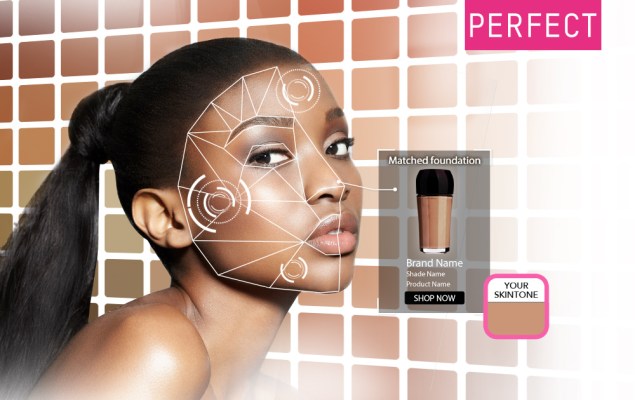
Spending on cosmetics has usually weathered economic crises, but that changed during the COVID-19 pandemic, with stay-at-home orders and masks tempering people’s desire to wear makeup. This forced retailers to accelerate their online strategies, finding new ways to capture shoppers’ attention without in-store samples. Virtual beauty try-on technology, like the ones developed by Perfect Corp., will play an important role in this shift to digital. The company announced today it has raised a Series C of $50 million led by Goldman Sachs.
Based in New Taipei City, Taiwan and led by chief executive officer Alice Chang, Perfect Corp . is probably best known to consumers for its beauty app, YouCam Makeup, which lets users “try on” virtual samples from over 300 global brands, including ones owned by beauty conglomerates Estée Lauder and L’Oreal Paris. Launched in 2014, YouCam Makeup now counts about 40 million to 50 million monthly active users and has expanded from augmented selfies to include live-streams and tutorials from beauty influencers, social features and a “Skin Score” feature.
Perfect Corp.’s technology is also used for in-store retail, e-commerce and social media tools. For example, its tech helped create a new augmented reality-powered try-on tool for Google Search that launched last month (its was previously used for YouTube’s makeup try-on features, too). It also worked with Snap to integrate beauty try-on features into Snapchat.
The new funding brings Perfect Corp.’s total raised so far to about $130 million. Its last funding announcement was a $25 million Series A in October 2017. The Series C will be used to further develop Perfect Corp.’s technology for multichannel retail and open more international offices (it currently has operations in 11 cities).
In a press statement, Xinyi Feng, a managing director in the Merchant Banking Division of Goldman Sachs, said, “The integration of technology through artificial intelligence, machine learning and augmented reality into the beauty industry will unlock significant advantages, including amplification of digital sales channels, increased personalization and deeper consumer engagement.”
Perfect Corp. will also be part of the investment firm’s Launch with GS, a $500 million investment initiative to support a diverse, international cohort of entrepreneurs.
The company uses facial landmark tracking technology, which creates a “3D mesh” around users’ faces so beauty try-ons look more realistic. In terms of privacy, chief strategy officer Louis Chen told TechCrunch that no user data, including photos or biometrics, is saved, and all computing is done within the user’s phone.
The vast majority, or about 90%, of Perfect Corp’s clients are cosmetic or skincare brands, while the rest sell haircare, hair coloring or accessories. Chen said the goal of Perfect Corp’s technology is to replicate the experience of trying on makeup in a store as closely as possible. When a user virtually applies lipstick, for example, they don’t just see the color on their lips, but also the texture, like matte, glossy, shimmer or metallic (the company currently offers seven lipstick textures, which Chen said is the most in the industry).
While sales of makeup have dropped during the pandemic, interest in skincare has grown. A September 2020 report from the NPD Group found that American women are buying more types of products than they were last year, and using them more frequently. To help brands capitalize on that, Perfect Corp. recently launched a tool called AI Skin Diagnostic solution, which it says verified by dermatologists and grades facial skin on eight metrics, including moisture, wrinkles and dark circles. The tool can be used on skincare brand websites to recommend products to shoppers.
Before COVID-19, YouCam Makeup and the company’s augmented reality try-on tools appealed to Gen Z shoppers who are comfortable with selfies and filters. But the pandemic is forcing makeup and skincare brands to speed up their adaption of technology for all shoppers. As a McKinsey report about the impact of COVID-19 on the beauty industry put it, “the use of artificial intelligence for testing, discovery and customization will need to accelerate as concerns about safety and hygiene fundamentally disrupt product testing and in-person consultations.”
“Depending on the geography of the brand, in the past probably only 10%, no more than 20%, of their business was direct to consumer, while 80% was going through retail distribution and distribution partnerships, the network they already built over the year,” said Chen. But beauty companies are investing more heavily in e-commerce now, and Perfect Corp. capitalizes on that by offering its technology as a SaaS.
Another way Perfect Corp. has adapted its offerings during the pandemic is offering remote consultation tools, which means beauty and skincare consultants who usually work in salons or a store like Ulta can demonstrate makeup looks on clients through video calls instead.
“Every single thing we are building now is not a siloed technology,” said Chang. “It’s now always combined with video-streaming.” In addition to one-on-one chats, this also means live-cast shopping, which is extremely popular in China and gradually taking off in other countries, and the kind of AR technology that was integrated into YouTube and Snapchat.






















